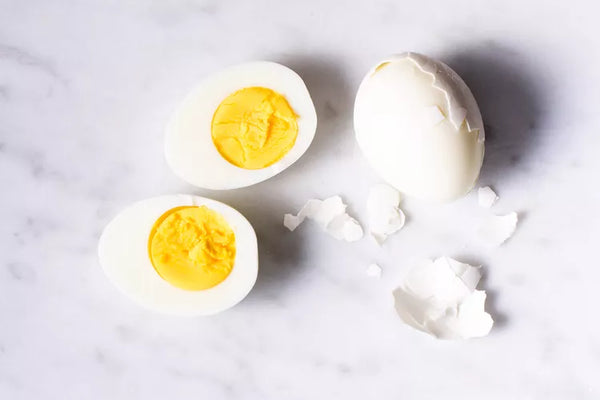
9 High Protein, Low Carb Vegetarian Foods

A high protein, low-carb vegetarian diet can be a little challenging to achieve. The main sources of plant-based protein, such as legumes and whole grains, usually contain high amounts of carbohydrates.
However, following a low-carb vegetarian diet is still possible, but there are some challenges to consider. If you eat eggs or dairy products, reducing your carbohydrate intake may not be too difficult.
But if you follow a strict vegan diet, you need to be extra careful to avoid reducing your protein intake to unhealthy levels.
Before discussing the challenges of following a low-carb vegetarian diet, it's worth knowing the reasons and ways people adopt low-carb diets.
Benefits of a Low-Carb Diet
The main reasons people follow a low-carb diet are for health and weight loss. A low-carb diet can reduce fluctuations in blood sugar and significantly decrease overall appetite. Additionally, there are other benefits that research has shown.
Low-Carb Diet Guidelines
Depending on your goals, your carb restriction may be relatively small, only requiring the elimination of starchy and sugary foods. Or it may be quite challenging, especially for those seeking rapid weight loss.
For the average adult male or female, daily targets for a low-carb diet can be categorized as follows:
- 100-150 grams per day to maintain a healthy weight
- 50-100 grams per day to gradually lose weight
- 20-50 grams per day to achieve ketosis and lose weight more quickly
Challenges in Dietary Patterns
Our bodies require various amino acids, the building blocks of protein, to maintain normal bodily functions. Of the 20 amino acids needed to build protein, nine must be obtained from food sources. Typically, the largest sources of these amino acids come from meat, fish, shellfish, and dairy products, which can pose a serious problem for strict vegetarians and vegans.
Furthermore, protein from some plant-based foods is considered incomplete, meaning they do not contain all the essential amino acids needed for protein synthesis. Therefore, even if you consume a lot of protein from certain plant-based foods, only a small portion will be absorbed in the intestines and transferred to the bloodstream.
Although some super-healthy foods like nuts are rich sources of protein, their high starch content makes them unsuitable for a strict low-carb diet. Similarly, while green vegetables contain protein, you need to eat them in large quantities to meet your daily needs.
For these reasons, if you follow a low-carb vegetarian or vegan diet, you need to seek out high-quality protein sources from various non-meat sources to meet your daily needs. However, if the protein is high in carbs, you need to remove it from your list or consume it in small amounts within your daily limit.
-
Vegetarian High-Protein Foods: Eggs

Eggs are an excellent source of complete protein. They are rich in easily absorbable nutrients, such as vitamin B12, choline, vitamin A, vitamin D, as well as the carotenoids lutein and zeaxanthin.
If you choose eggs from chickens with varied diets (preferably free-range), their nutrient content will be higher.
-
Dairy Products
Dairy products such as milk, yogurt, and cheese provide a lot of protein, as well as calcium and riboflavin. It is important to check the product label to avoid added sugar that can ruin your low-carb diet plan. Dairy products high in protein include:
Cottage cheese: 15 grams per 1/2 cup Hard cheese (such as parmesan): 10 grams per 1 ounce Medium cheese (such as cheddar): 7 or 8 grams per 1 ounce Milk: 8 grams per 1 cup Soft cheese (such as mozzarella and brie): 6 grams per 1 ounce Yogurt: 8 to 12 grams per 1 cup
-
Vegetarian High-Protein Foods: Whole Soybeans

The star of plant-based protein is soybeans. If you can tolerate soy, it can be a rich source of protein while providing fewer carbohydrates than other legumes. This type of food is also rich in fiber, vitamin K, iron, magnesium, copper, manganese, riboflavin, and phytonutrients like genistein.
Whole soybeans are good because almost all of their fiber, vitamins, minerals, and phytonutrients are preserved after cooking. Black soybeans have a milder taste than yellow soybeans and can be used as a substitute for high-carbohydrate legumes in any recipe. You can also find organic, non-GMO black soybeans in BPA-free cans.
Edamame (fresh soybeans) is another excellent option for whole soybeans and can be a fun snack or salad addition. There are also soy-based foods that are processed to mimic meat products. However, since soy isolate is mixed with flavors and other ingredients, check the product label to see its protein and carbohydrate content.
-
Vegetarian High-Protein Foods: Soy Milk
One famous soy product that is high in protein is soy milk. Soy milk is made by grinding soybeans with water, then going through various filtration, homogenization, and stabilization processes to create a texture like cow's milk.
Since the process and additional ingredients can vary, the amount of carbohydrates and protein can also vary. Always check the product label. To limit carbohydrates, you may need to choose a variety that is not mixed with sugar.
-
Tofu

Tofu is made by coagulating soy milk and pressing out the water. It has a smooth taste and a texture that easily absorbs any flavor you add. Tofu is one of the most popular meat substitutes in Asian cuisine and can be used in various non-Asian recipes as well.
Silken tofu is available in a long-lasting box and is good for mixing into shakes, puddings, and similar "soft" foods. Tofu stored in the refrigerator is denser and good for stir-fries and other dishes. You can press more water out of tofu to get a denser texture, ideal for baking.
-
Vegetarian High Protein Food: Tempeh
Tempeh originated from Indonesia and is made from whole cooked soybeans that are fermented and compacted into cakes. It is denser than tofu and does not absorb flavors as well.
Tempeh is also the only major traditional soy food that does not come from Chinese cuisine. Its chewy texture makes it an attractive meat substitute as it can be cooked by grilling or frying.
-
Seitan
Perhaps the biggest change that vegetarians face with a low-carb diet is the need to reduce grains. Grains contain protein - not as much as soybeans or legumes, but enough to help meet your daily nutritional needs.
Because grains are mostly starch, they are often the first thing eliminated from a low-carb diet. Fortunately, there is one major exception: seitan, a high-protein, low-carb food product made from wheat gluten.
Seitan is sometimes called "wheat meat" or "fake duck" because of its thick texture. It is often shaped into loaves or cubes and is commonly found in many Asian cultures.
-
Legumes and Grains

Legumes, grains, and nut butters are a good way to boost your daily protein intake, but are more suitable as snacks, toppings, or spreads than as a main protein source. Although legumes and grains are high in protein and relatively low in carbohydrates, they primarily contain fats (on average between 65% to 85%).
Therefore, portion control is very important. If you sit down with an open container of nuts, you can easily consume a cup and completely derail your low-carb diet goals. To avoid this, divide the nuts you purchase into portions that are appropriate for one meal.
-
Vegetarian High Protein Food: Protein Powder







